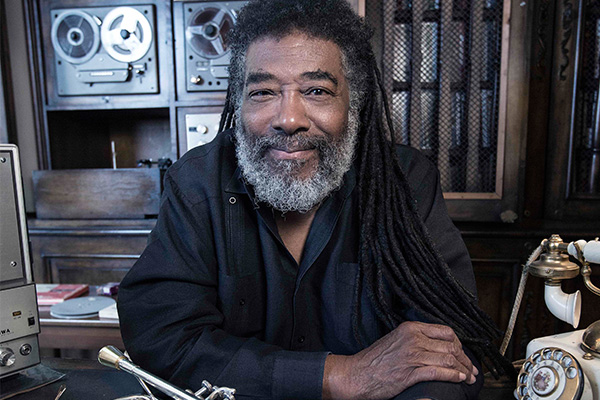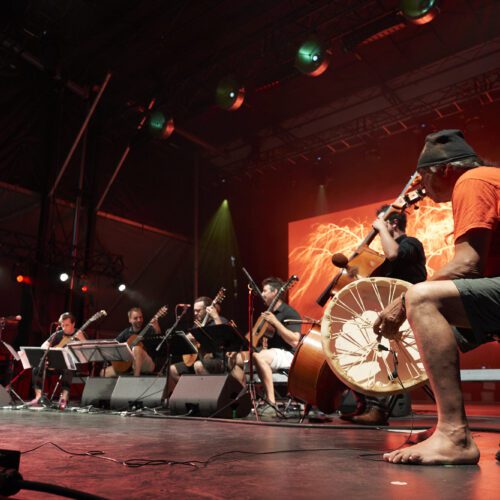Wadada Leo Smith
Wadada Leo Smith est un trompettiste et compositeur américain. Il est devenu membre de l’Association for the Advancement of Creative Music, basée à Chicago, en 1967, et a enregistré et joué de nombreuses œuvres depuis lors. Leo Smith sera accompagné de la pianiste Sylvie Courvoisier pour interpréter Central Park’s Mosaics of Reservoir, Lake, Paths and Gardens.
Smith a été finaliste du prix Pulitzer de musique 2013 pour Ten Freedom Summers, (Defining Moments in the History of the United States of America), une collection de compositions inspirées par le mouvement des droits civiques et publiée sous la forme d’un coffret de 4 CD.
Smith a été nommé compositeur de l’année par le magazine DownBeat en 2013.
En 2016, Smith a reçu un Doris Duke Artist Award et un doctorat honorifique de CalArts, où il a également été célébré en tant que professeur émérite. En outre, le musée Hammer lui a décerné en 2016 le prix Mohn pour l’ensemble de sa carrière, qui rend hommage à sa brillance et à sa résilience. En 2018, il a reçu le prix Religion et Arts de l’Académie américaine de religion. En 2019, il a reçu la médaille UCLA, la plus haute distinction décernée par l’université de Californie à Los Angeles. United States Artists a nommé Smith 2021 USA Fellow, et il a été sélectionné comme 2022 Mellon Arts & Practitioner Fellow au Yale Center for the Study of Race, Indigeneity and Transnational Migration (RITM).
Il a joué et/ou enregistré avec Anthony Braxton, Leroy Jenkins, Roscoe Mitchell, Henry Threadgill, Lester Bowie, Joseph Jarman, Cecil Taylor, Steve McCall, Anthony Davis, Carla Bley, Don Cherry, Jeanne Lee, Tadao Sawai, Muhal Richard Abrams, Ed Blackwell, Kazuko Shiraishi, Han Bennink, Marion Brown, Charlie Haden, Malachi Favors Magoustous, Jack DeJohnette, Vijay Iyer, Ikue Mori, Min Xiao Fen, Bill Laswell, John Zorn, Ronald Shannon Jackson, Frank Lowe, parmi beaucoup d’autres.
Wadada Leo Smith is an American trumpeter and composer. He became a member of the Chicago based Association for the Advancement of Creative Music in 1967 and has recorded and performed extensively since this time. Smith will be joined by pianist Sylvie Courvoisier to perform Central Park’s Mosaics of Reservoir, Lake, Paths and Gardens.
Smith was a finalist for the 2013 Pulitzer Prize in Music for Ten Freedom Summers, (Defining Moments in the History of the United States of America), a collection of compositions inspired by the civil rights movement and released as a 4-CD boxed set. Smith was named DownBeat Magazine’s Composer of the Year in 2013.
In 2016 Smith received a Doris Duke Artist Award and earned an honorary doctorate from CalArts, where he was also celebrated as Faculty Emeritus. In addition, he received the Hammer Museum’s 2016 Mohn Award for Career Achievement “honoring brilliance and resilience.” In 2018 he received the Religion and The Arts Award from the American Academy of Religion. In 2019 he received the UCLA Medal, the highest honor bestowed by the University of California, Los Angeles. United States Artists named Smith a 2021 USA Fellow, and he has been selected as a 2022 Mellon Arts & Practitioner Fellow at the Yale Center for the Study of Race, Indigeneity and Transnational Migration (RITM).
Smith has performed and/or recorded with Anthony Braxton, Leroy Jenkins, Roscoe Mitchell, Henry Threadgill, Lester Bowie, Joseph Jarman, Cecil Taylor, Steve McCall, Anthony Davis, Carla Bley, Don Cherry, Jeanne Lee, Tadao Sawai, Muhal Richard Abrams, Ed Blackwell, Kazuko Shiraishi, Han Bennink, Marion Brown, Charlie Haden, Malachi Favors Magoustous, Jack DeJohnette, Vijay Iyer, Ikue Mori, Min Xiao Fen, Bill Laswell, John Zorn, Ronald Shannon Jackson, Frank Lowe, among many others.
Sylvie Courvoisier
La pianiste-compositrice Sylvie Courvoisier, originaire de Suisse et installée à Brooklyn, lauréate du prix international de piano jazz en Allemagne en 2022, est réputée pour son équilibre entre deux mondes distincts : la musique de chambre profondes et riches de subtilités liées à ses racines européennes et les sons groovy et syncopés de la scène avant-jazz de New York, où elle vit depuis plus de vingt ans.
Peu d’artistes se sentent vraiment à l’aise à la fois dans les salles de concert et dans les clubs de jazz, qu’ils jouent de la musique improvisée ou composée. Mais Mme Courvoisier – « une pianiste à la fois audacieuse et pleine d’assurance », selon le New York Times – est aussi convaincante lorsqu’elle interprète l’épique Sacre du printemps de Stravinsky, avec le pianiste de musique nouvelle Cory Smythe, que lorsqu’elle improvise avec son propre trio de jazz adulé par la critique et composé du contrebassiste Drew Gress et du batteur Kenny Wollesen.
Ses collaborations avec des sommité.e.s telles que John Zorn, Wadada Leo Smith, Evan Parker, Ikue Mori, Ned Rothenberg, Fred Frith, Andrew Cyrille, Mark Feldman, Christian Fennesz, Nate Wooley et Mary Halvorson ont largement contribué à ouvrir toujours davantage ses oreilles.
Pianist-composer Sylvie Courvoisier, a Brooklyn-based native of Switzerland and winner of Germany’s International Jazz Piano Prize in 2022, has earned renown for balancing two distinct worlds: the deep, richly detailed chamber music of her European roots and the grooving, hook-laden sounds of the avant-jazz scene in New York City, her home for more than two decades.
Few artists feel truly at ease in both concert halls and jazz clubs, playing improvised or composed music. But Courvoisier — “a pianist of equal parts audacity and poise,” according to The New York Times — is as compelling when performing Stravinsky’s epochal Rite of Spring in league with new-music pianist Cory Smythe as she is when improvising with her own acclaimed jazz trio, featuring bassist Drew Gress and drummer Kenny Wollesen.
Then there are her ear-opening collaborations with such luminaries as John Zorn, Wadada Leo Smith, Evan Parker, Ikue Mori, Ned Rothenberg, Fred Frith, Andrew Cyrille, Mark Feldman, Christian Fennesz, Nate Wooley and Mary Halvorson.
Rehab Hazgui
Rehab Hazgui est compositrice et écologiste sonore. Ses œuvres d’art explorent les moyens d’apprendre de nouvelles formes de langages par l’écoute consciente et la relation que les êtres entretiennent avec leur culture, leur patrimoine, leur société et leur paysage en tant que participants impliqués et vivants. Ses recherches portent sur la manière dont le son émerge à travers des paysages dynamiques, y compris ceux qui sont biologiques, géophysiques et issus des conséquences humaines. Rehab Hazgui s’intéresse principalement à l’acte d’écoute lui-même, dans la mesure où il est lié à notre perception de l’espace, à notre relation avec lui et au niveau profond d’engagement avec le monde que nos oreilles nous procurent. Dans sa musique, elle explore constamment le mouvement sans fin du son, la répétition et l’utilisation du silence comme une troisième dimension permettant de naviguer entre différentes formes d’écoute.
Au cœur de sa recherche sonore se trouve le concept d’interaction cognitive synergique, qui intègre une collaboration transparente entre les humains et les machines afin de créer une performance musicale liminale. Sa musique est une expérience unique et innovante qui transcende les notions traditionnelles de musique et de technologie, offrant à l’auditeur.rice. un voyage sonore sans précédent. Ses créations sonores défient la perception du temps et de l’espace de l’auditeur.rice., mettant en valeur son approche distincte de l’expérimentation et de l’exploration sonores. Le travail de Rehab Hazgui a été présenté dans de nombreux festivals et lieux : The Art Week (Singapour), Phonetics (Alger), CTM (Berlin), Kikk (Namur, Belgique), Savvy Contemporary (Berlin), Phonetics (Saint Denis, Paris), Perte de Signal (Montréal), Sight & Sound (Montréal), The Mannheimer Sommer Festival (Mannheim, Allemagne) ; ainsi que d’innombrables ateliers à travers l’Europe consacrer à la construction de synthétiseurs et d’appareils audio DIY.
Rehab Hazgui is a composer and sound ecologist. Her artworks explore ways to learn new forms of languages through conscious listening and the relationship that beings have with their culture, heritage, society and landscape as involved and living participants. Her research examines the ways in which sound emerges through dynamic landscapes, including those that are biological, geophysical, and human consequences. Rehab Hazgui’s primary focus is on the act of listening to itself, as it relates to our perception of space, our relationship to it, and the profound level of engagement that our ears provide with the world. In her music she is constantly exploring the endless movement of sound, repetition, and the use of silence as a third space to navigate between different forms of listening.
At the heart of her sonic research is the concept of achieving a synergetic cognitive interaction, which involves the seamless collaboration between human and machine to create an integrated and boundary-pushing musical performance. Her music is a unique and innovative experience that transcends traditional notions of music and technology, offering an unparalleled sonic journey for the listener. Her sonic creations challenge the listener’s perception of time and space, showcasing her distinct approach to sonic experimentation and exploration. Rehab Hazgui’s work has been presented in many festivals and venues: The Art Week (Singapore), Phonetics (Algiers), CTM (Berlin), Kikk (Namur, Belgium), Savvy Contemporary (Berlin), Phonetics (Saint Denis, Paris), Perte de Signal (Montreal), Sight & Sound (Montreal), The Mannheimer Sommer Festival (Mannheim, Germany); as well as countless workshops across Europe on building DIY synthesizer and audio devices.
POUR ACHETER VOTRE BILLET, C’EST ICI!
Ce contenu provient du festival FLUX et est adapté par PAN M 360
























